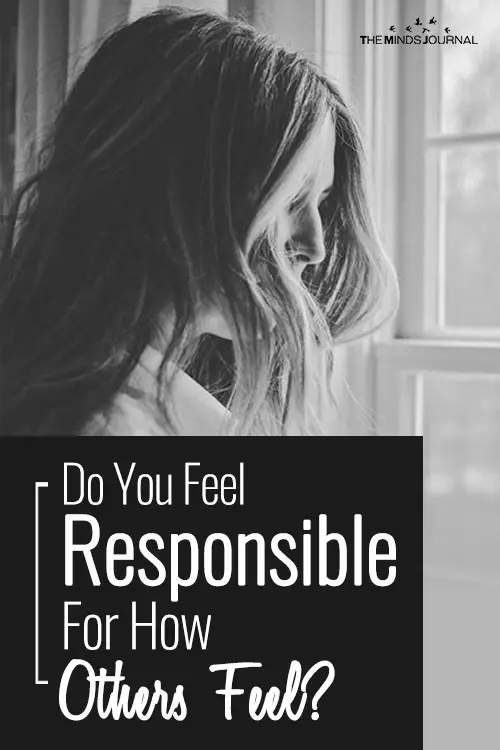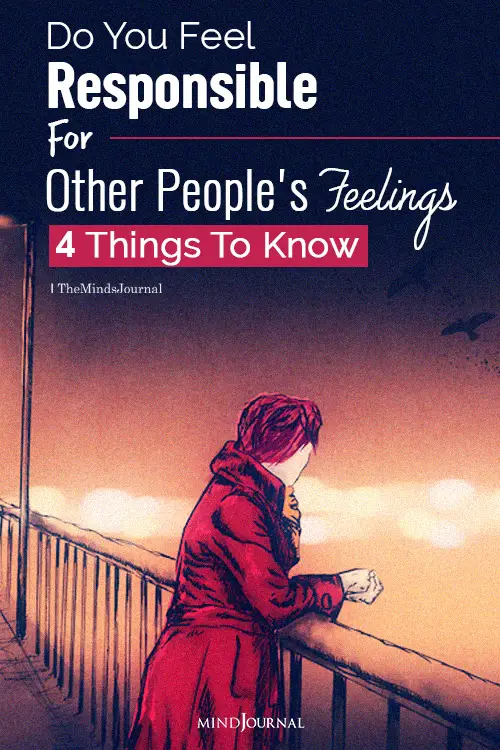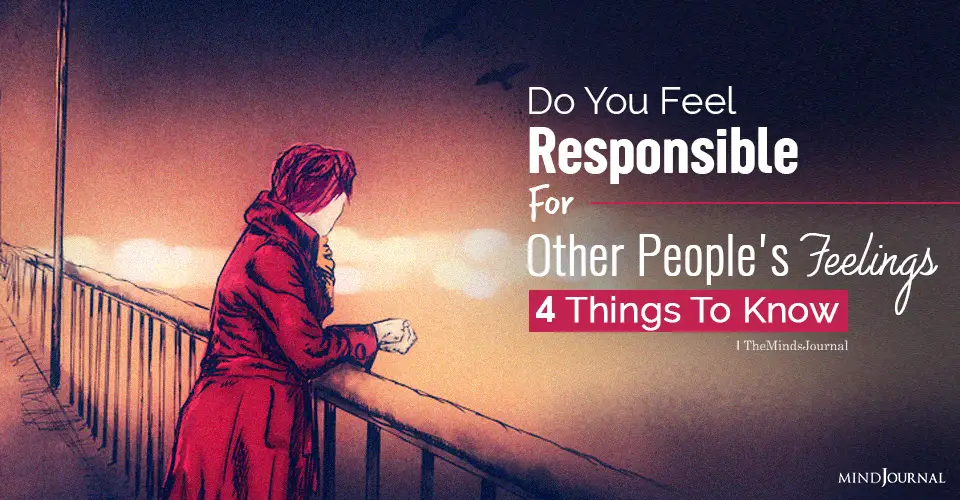Do you think you feel responsible for other people’s lives? If you struggle with this feeling then you need to realize that you’re NOT responsible for someone’s emotions or their lives. And no one is responsible for yours either.
Do you feel responsible for other people’s feelings? I know that this topic resonates with so many of you as you genuinely care about others. I’ve met more caring people than not in my life, and I also know that if you’re one of them, then you have a hard time defining your boundaries.
Recently, a friend of mine told me about the visit to her best friend who has relationship problems. My friend did her best to make her friend happy, but it didn’t work out. On the contrary, her best friend was complaining even more. All the negativity got out of control.
After my friend left, she felt heavily burdened by all those problems they discussed. She wanted to figure out a way how to help her best friend feel better. She also felt responsible for making her best friend happy.
But did it work out? No. And here is the reason.
Some people value suffering over happiness, and there is nothing you can do about it unless they genuinely ASK you for help and they’re ready to do the work.
I know that this concept might be difficult to bring into reality, but you’ll save yourself so much worrying which doesn’t lead anywhere good.
Some people just want you to feel sorry for them and it makes them feel good. They need your attention and they aren’t necessarily interested in solving the problem. They’ll tell you that they know you’re right to text you an hour later telling you what terrible happened once again.
I know that this sounds harsh, but it’s true. You can only meet people where they’re at in their life. And if their current state of mind is the wish to complain, then this is their choice.
Related: How to Stop Absorbing Other People’s Emotions
You can never help a person who doesn’t want to be helped.
This is especially visible in parent-child relationships. Maybe you see your parents unhappy and restricting themselves in irrational ways, but you can’t explain to them that life can be different. Regardless of how much you help them, it feels like hitting the wall. I guess that many of you have this experience.
“You must take personal responsibility. You cannot change the circumstances, the seasons, or the wind, but you can change yourself. That is something you have charge of.” – Jim Rohn
Do you feel responsible for other people’s feelings?
Here Are 4 Things You Should Know If You Feel Responsible For Other People’s Feelings
1. You’re A Loving Being.
I repeat this often at my workshops; under all that dirt and fear is love.
We want to help others because we genuinely care. That is a good thing, but it’s better to direct your help at people who WANT to be helped.
You can use your good intentions and loving heart for people who are ready for it. Not everyone is ready to receive love.
In reality, this seems to be one of the most challenging things on this planet. People are at different stages and levels of consciousness, so you can choose to do the good for people who are waiting for it.
If you waste all your energy on people, who value pain more than you can’t help where it makes a difference.
Since you’re reading these words, it’s very likely that you’re an empath (a highly sensitive individual).
2. Don’t Get Involved In People’s Dramas.
When we’re pulled into the lives of others, we can easily lose sight of our own lives. To put it very simply, if you think and talk about other people’s lives, then you call into your life THEIR energy. This is the same energy that has created the drama in their lives in the first place.
So guess what does it do with you? Yes, it creates the same drama in your life.
Have you ever noticed that when you were too involved in the life of someone else that you began to experience similar problems?
This doesn’t make your relationship with them stronger (which is what we try unconsciously to do), it just means that you have their energy in your life that is causing the havoc.
“No one can make you feel inferior without your consent.” – Eleanor Roosevelt
Related: The Subtle Art Of NOT Giving A Fuck
3. Support Them Instead Of Trying To Fix Them.
Each of us has to experience different lessons to learn and grow at various levels.
If you fix someone’s problem, then you deprive them of their lesson.
Which only means that they’ll have to create the same problematic situation so they can finally learn what they’re expected to learn. You can choose to support them instead by encouraging them or telling them where they can find information or help they need.
You can help them to see why they’re in such a situation but don’t try to solve it instead of them. Of course, another situation is when they specifically ask you to help them. Then you have permission to intervene in their life.
4. Help Them To Regain Faith In Themselves.
It’s of much greater service if you tell them that they have their own guidance system and that they can trust it. They may lack the confidence about being able to help themselves and if you’d treat them like a small kid and taking off their burdens how would they learn their value?
I know that it’s sometimes difficult, but the true loving response isn’t to go and save them but lovingly remind them of their own strengths.
Here’s a helpful video that you may find interesting:
Written by Sylvia Salow Originally appeared in Sylvia Salow










Leave a Reply
You must be logged in to post a comment.